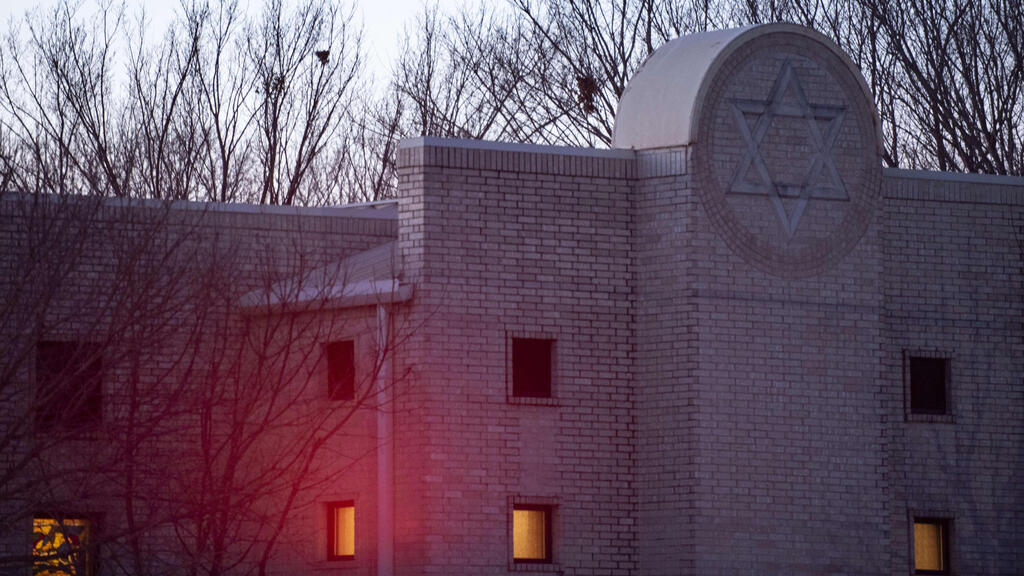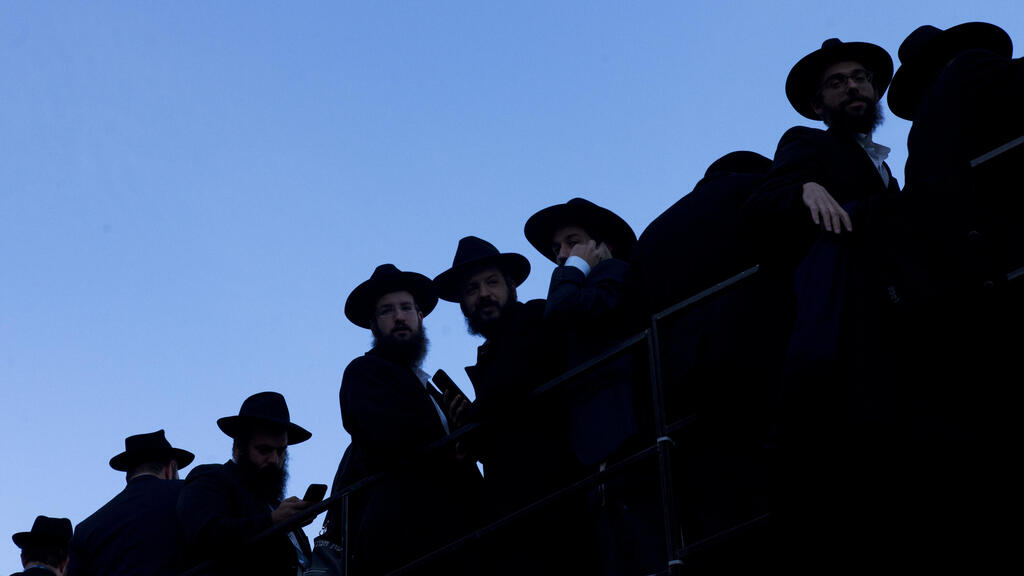Forty-one percent of Jews in the United States they they feel is less secure compared to a year ago, according to a new survey published Monday.
The fourth annual report by the American Jewish Committee (AJC) State of Antisemitism in America Report assesses and compares Jewish and general population perceptions of and experiences with antisemitism in the United States.
7 View gallery


Pro-Israel demonstrators attend a rally denouncing anti-Semitism in Manhattan, May 23, 2021
(Photo: AFP)
Based on one of the largest-ever combined national surveys of American Jews and the U.S. general public, the report demonstrates the impact that rising hatred of Jews has on America’s Jewish community.
The release of the data, from surveys done in 2022, comes two months after the White House announced the creation of a new federal interagency group that will develop a national strategy to combat antisemitism.
“No Jew in the United States, especially the younger generation, should ever feel unsafe for expressing their Jewish identity. Yet rising antisemitism is having a deeply disturbing effect on American Jews and American society in general,” said AJC CEO Ted Deutch. “We look forward to working with the White House in developing effective strategies for a whole-of-government approach to combat Jew-hatred once and for all.”
7 View gallery


Doug Emhoff, the husband of Vice President Kamala Harris, speaks during a roundtable discussion with Jewish leaders about the rise in antisemitism, Dec. 7, 2022
(Photo: AP / Patrick Semansky)
The AJC survey of American Jews found 41% of Jewish respondents consider the status of Jews in the U.S. less secure than a year ago, up from AJC’s 2021 report when 31% gave that answer.
There is also broad recognition that antisemitism is not just a problem for Jews to deal with. Nine in 10 of both American Jews (89%) and the U.S. general public (91%) agree antisemitism affects American society as a whole.
At the same time, however, 48% of Jews and 34% of the general population believe antisemitism is taken less seriously than other forms of hate and bigotry.
The survey found antisemitism is regularly experienced online or on social media. Overall, 69% of U.S. Jews experienced antisemitism online, either as a target or by seeing antisemitic content, in the past 12 months. Younger Jews were more likely to have experienced antisemitism this way – 85% of those 18-29 years old compared with 64% of those aged 30 or older.
Among those who experienced antisemitism online, younger Jews, 26%, were also more likely than older cohorts, 14%, to say these online incidents made them feel physically threatened.
In addition, among the 36% of U.S. general population adults who have personally witnessed one or more antisemitic incidents in the past year, 82% saw those incidents online or on social media, while 19% saw them on the street, 14% saw them in a store, and 10% saw them on public transit.
Jewish Sense of Safety
One in four Jews (26%) were the target of antisemitism in 2022. Of these individuals, 20% reported being the target of antisemitic remarks in person and 13% say they were targeted online or on social media.
Thirty-eight percent of all Jewish respondents reported that they have altered their behavior at least once in the past year due to fears of antisemitism: 27% avoided posting content online that would enable others to identify them as Jewish or reveal their views on Jewish issues; 23% avoided wearing or displaying things that might enable others to identify them as Jewish; and 16% avoided certain places, events, or situations due to concerns about their safety or comfort as Jews.
The 2022 AJC survey also asked about Jewish confidence in law enforcement addressing antisemitism. Among Jewish adults overall, 63% say law enforcement is effective in responding to the needs of the Jewish community. Younger Jewish adults are less likely than their older counterparts to have confidence in law enforcement.
Among 18–29-year-old Jews, 48% say law enforcement is very or somewhat effective, compared with 67% of U.S. Jews age 30 or older. Among Orthodox Jews, 65% say law enforcement is effective, a sharp decrease from 81% in 2021; the results are unchanged for other denominations and secular Jews.
On a range of issues, American Jews and the U.S. general public continue to hold differing views on the extent and severity of anti-Jewish prejudice in the U.S. While 89% of American Jews believe antisemitism is a problem in the U.S. today, 68% of U.S. adults agree. Forty-three percent of Jewish respondents said it is a very serious problem, compared with 22% of U.S. adults. Meanwhile, 82% of Jews say antisemitism has increased over the last five years, compared to 47% of the general population, with 43% of Jews and 16% of U.S. adults saying it has increased a lot.
To gauge how Jews have altered their behavior on college campuses, new questions were asked of current college students or those who have been students in the past two years, as well as of the parents of current and recent students. Just over a third (36%) have avoided or experienced at least one of the following: 26% say they experienced difficulty taking time off from class or were told they could not miss class for the Jewish holidays; 21% say they avoided wearing or carrying things that identify them as Jewish; and 18% said they have felt uncomfortable or unsafe at a campus event because they are Jewish.
Workplace Antisemitism
The 2022 survey asked U.S. Jews for the first time about their experiences in the workplace. For employed American Jews, 33% say they have avoided or experienced at least one of the following issues this past year: 22% say they avoided expressing their views on Israel; 10% say they avoided wearing or displaying something that would identify them as Jewish; 10% had trouble taking time off work for the Jewish holidays; and 8% say they felt unsafe or uncomfortable in their workplace because of their Jewish identity.
Nearly seven in 10 U.S. adults (69%) say they have heard the term antisemitism and know what it means, while 22% have heard the term but are unsure of its meaning, both similar to findings from the 2021 AJC report. In 2022, however, fewer adults, 9%, say they have never heard the term compared to 16% in 2021.
General Population Views on Israel, BDS
Nine in 10 U.S. adults agree the statement “Israel has no right to exist” is antisemitic. 35% said they are familiar with the Boycott, Divest, and Sanctions (BDS) movement directed against Israel. Among those aware of BDS, 38% said BDS is mostly antisemitic and 50% said it has some antisemitic supporters.
Holocaust Knowledge
The survey of U.S. adults encompassed for the first time a series of questions on Holocaust knowledge, including when the Holocaust happened, how many Jews were killed, what was Auschwitz, and how Adolf Hitler became chancellor of Germany. Only 26% of survey respondents answered all four questions correctly, while 30% got three and 25% had two correct. Those findings were released on January 24, in advance of International Holocaust Remembrance Day.
Colleyville Synagogue Attack
Both Jews and U.S. adults were asked about the January 2022 attack on a synagogue in Colleyville, Texas. Those findings were released on January 12 ahead of the one-year anniversary of the attack.
7 View gallery


Congregation Beth Israel synagogue in Colleyville, Texas
(Photo: Emil Lippe/Getty Images/AFP)
The surveys of American Jews and U.S. adults were conducted for the nonpartisan American Jewish Committee by the independent research firm SSRS. National representative samples of 1,507 Jews, ages 18 or older, were interviewed by telephone and online from September 28 – November 3, 2022, and 1,004 general population adults, 18 or older, via the SSRS Opinion Panel, from October 10 – October 18, 2022. The margin of error for Jewish respondents is +/-3.4 percentage points and for total U.S. adult respondents is +/-3.8 percentage points at the 95% confidence level.
Report edited by Hadas Bar-Ad





